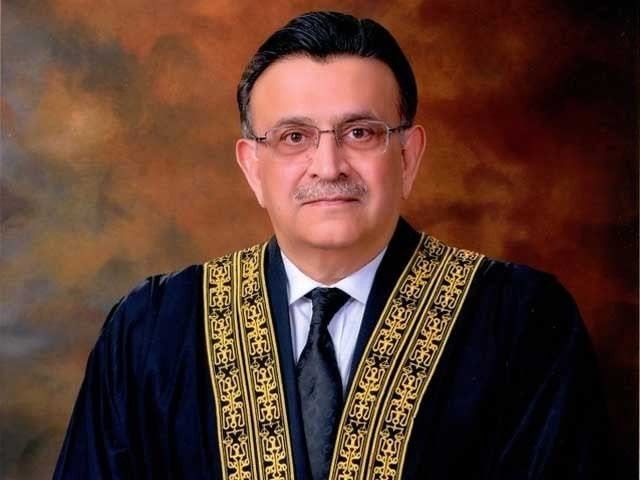Defection is akin to betrayal, remarks CJ
Justice Bandial says duty of every lawmaker to be loyal to party

Chief Justice of Pakistan Umar Ata Bandial observed on Wednesday that loyalty was the fundamental principle of the Constitution.
The chief justice’s remarks came as the apex court resumed hearing on the presidential reference, concerning the interpretation of Article 63(A), filed by the Pakistan Tehreek-e-Insaf’s (PTI) government.
“Defection is betrayal. It is the opposite of loyalty, which is a fundamental principle of the Constitution,” the CJP observed. He added that Article 5 of the Constitution focuses on loyalty. “It is the duty of every member of parliament to be loyal to his party,” the CJP maintained.
However, the CJP added that the party head may condone the defection by not forwarding a declaration to the National Assembly speaker.
However, counsel for the Pakistan Peoples Party (PPP) Farooq H Naek said that disloyalty was a harsh word.
Is ‘disloyalty’ the same as ‘dishonesty’?
Moreover, Justice Ijaz ul Ahsan stated that if disloyalty was tantamount to dishonesty then Article 62(1)(f) of the Constitution will be applicable to the lawmaker, and they will be disqualified for life.
The judge further maintained that the party was the backbone of the parliamentary system.
Justice Ijazul Ahsan questioned whether disloyalty to a political party by a parliamentarian was dishonesty and could lead to his disqualification.
He further asked whether a lawmaker could be disqualified over "dishonesty" if disloyalty was counted as “dishonesty”.
However, Naek insisted that Article 62(1)(f) could not be applied on account of defection. He said that "disloyalty" was a strong word, adding that it was not mentioned in Article 63-A.
He argued that there was a difference between “loyalty” and “slavery”, adding if the court thinks defection warranted lifetime disqualification then it would be equivalent to re-writing the Constitution.
At the outset of the hearing, Naek mentioned that Article 58-2(b), which has been used in the past to remove elected governments, was abrogated in 1997 through the 13th Amendment but was brought back by military dictator Pervez Musharraf in 2002.
The article was again removed through the 18th Amendment in 2018.
Article 63-A was made a part of the Constitution through the 14th Amendment, vesting broad powers in party heads, the PPP counsel added.
Forswearing oath?
During the course of proceedings, Justice Ahsan mentioned that in the nomination papers, the ticket holders swear that they would not go against the party’s policy.
Read Not bothered by campaigns against judges: CJ
Naek said that the rules for punishing a party worker for violating party discipline were underlined in Article 63-A of the Constitution, adding that a dissident party member would as a result lose his seat.
Justice Munib Akhtar remarked that not abiding by one's oath amounted to "dishonesty", adding that a dissident is elected on a ticket from a particular political party.
The CJP remarked that loyalty had been equated to party policy. He cited the attorney general's arguments who told the court that Article 63-A dealt with loyalty.
"Loyalty is a basic constitutional principle," the CJP said. "Article 5 states that every party member should be loyal to the state," he said, adding that "disqualification was a minor matter".
Naek argued that a party worker was not a "slave" who follows all directives.
At this, Justice Ahsan wondered whether government employees would be considered slaves if so was the case, observing all parties have some rules and regulations that are to be abided by.
The CJP observed that if a person is disqualified over dishonesty, they would also be disqualified from the next election.
"This is not written anywhere in the Constitution," Naek shot back. "Show me where it is written and I will leave the rostrum.
Meanwhile, Advocate General Sindh Salman Talibuddin argued that the insertion of Article 63(A) of the Constitution reflects how mature democracy is in the country.
He requested the SC to return the presidential reference unanswered, questioning the timing of the reference’s filing and terming it “dubious”.
Concluding the day’s hearing, CJP Bandial asked the counsels for all the parties to explain to the court the purpose of the right to appeal granted to the lawmaker under Article 63(A) if they have already been de-seated by the Election Commission. “What will the SC decide the appeal under>” he questioned.
The hearing of the reference has been adjourned till tomorrow.
A day earlier, while hearing the case, Justice Ijazul Ahsan, while referring to the recent criticism of the Supreme Court’s recent judgments, observed that it had become a culture in the country to blame courts if the decisions pronounced by the judges did not favour the parties involved.
Justice Ahsan, who sits on the five-member bench hearing a presidential reference seeking interpretation of Article 63-A, made the remarks a day after Chief Justice Umar Ata Bandial asked why the apex court’s adjudication upon political matters was sought in the first place when leaders end up subjecting it to curses at rallies.
Apparently referring to former PM Imran Khan, who feels aggrieved by the judiciary’s actions on the eventful night of his ouster through a no-confidence vote ordered by the top court, the chief justice had said how could the judiciary deliver judgments if some political leader manages to gather 10,000 to 15,000 people in political rallies, only to reject the verdicts.



















COMMENTS
Comments are moderated and generally will be posted if they are on-topic and not abusive.
For more information, please see our Comments FAQ